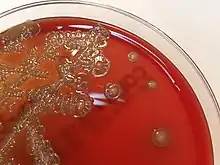Flavobacteriales
| Flavobacteriales | |
|---|---|
 | |
| Bergeyella zoohelcum | |
| Scientific classification | |
| Domain: | Bacteria |
| Phylum: | Bacteroidota |
| Class: | Flavobacteriia |
| Order: | Flavobacteriales Bernardet 2012[1] |
| Families[2] | |
| |
The order Flavobacteriales comprises several families of environmental bacteria.[3]
Comparative genomics and molecular signatures
Flavobacteriales is of one of the orders from the phylum "Bacteroidetes".[2] Comparative genomic studies have identified several conserved indels, as well as 27 proteins that are uniquely shared by different sequenced Flavobacteriales and Bacteroidetes species supporting this inference.[4][5] Additionally, these studies have also identified 38 proteins that seem to be specific for the species from the order Flavobacteriales.[5] Of these proteins, 26 were present in all sequenced species, while the remaining 12 were missing in only one or two species. These signature proteins provide potential molecular markers for this order. Several proteins have also been identified which are unique to the Flavobacteriales and Bacteroidales orders, indicating the species from these two orders shared a common ancestor exclusive of other "Bacteroidetes".[5]
Phylogeny
The currently accepted taxonomy is based on the List of Prokaryotic names with Standing in Nomenclature[2] and the phylogeny is based on whole-genome sequences.[6][lower-alpha 1]
| |||||||||||||||||||||||||||||||||||||
Notes
- ↑ Blattabacteriaceae is not included in this phylogenetic tree.
References
- ↑ Bernardet J-F. (2010). "Order I. Flavobacteriales ord. nov.". In Krieg NR, Staley JT, Brown DR, Hedlund BP, Paster BJ, Ward NL, Ludwig W, Whitman WB (eds.). Bergey's Manual of Systematic Bacteriology. Vol. 4 (2nd ed.). New York, NY: Springer. p. 105.
- 1 2 3 Euzéby JP, Parte AC. "Flavobacteriales". List of Prokaryotic names with Standing in Nomenclature (LPSN). Retrieved June 29, 2021.
- ↑ Boone DR, Castenholz RW, eds. (2001). Bergey's Manual of Systematic Bacteriology. Vol. 1 (The Archaea and the deeply branching and phototrophic Bacteria) (2nd ed.). New York, NY: Springer-Verlag. pp. 465–466.
- ↑ Gupta RS. (2004). "The phylogeny and signature sequences characteristics of Fibrobacteres, Chlorobi, and Bacteroidetes". Critical Reviews in Microbiology. 30 (2): 123–140. doi:10.1080/10408410490435133. PMID 15239383. S2CID 24565648.
- 1 2 3 Gupta RS, Lorenzini, E. (2007). "Phylogeny and molecular signatures (conserved proteins and indels) that are specific for the Bacteroidetes and Chlorobi species". BMC Evolutionary Biology. 7: 71. doi:10.1186/1471-2148-7-71. PMC 1887533. PMID 17488508.
- ↑ García-López M, Meier-Kolthoff JP, Tindall BJ, Gronow S, Woyke T, Kyrpides NC, Hahnke RL, Göker M (2019). "Analysis of 1,000 Type-Strain Genomes Improves Taxonomic Classification of Bacteroidetes". Front Microbiol. 10: 2083. doi:10.3389/fmicb.2019.02083. PMC 6767994. PMID 31608019.